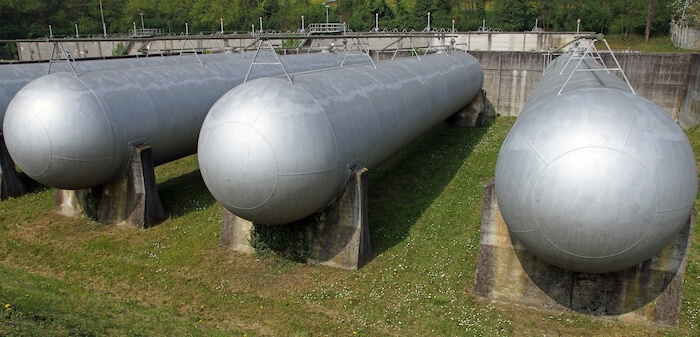Do you remember the plastic ruler you had in elementary school? Often it was used for much more than just measuring. Then one day, for no apparent reason, the ruler breaks. By constantly fiddling with it, cracks had formed on the external surface, which had simply spread until it fractured. This phenomenon also applies to pressure vessels. You might not think you have much experience with pressure vessels in residential or commercial applications, but you probably have seen a propane tank on your grill, a helium tank to fill balloons or a hot water tank in your home. Larger pressure vessels can be found at gas stations, industrial sites and many manufacturing plants.

Figure 1, typical horizontal pressure vessel supported by 2 saddles
During the design, manufacturing, inspection and certification stages of a pressure vessel installed in Canada, all possible scenarios it might be put under must be considered and designed for. Here are some examples of external loadings to consider:
- Internal or external design pressure;
- Weight of the vessel and contents;
- Weight of attached equipment, such as motors, machinery, other vessels, piping, linings, and insulation;
- Loadings transferred by internal structures and vessel supports, such as lugs, rings, skirts, saddles, and legs;
- Wind, snow, and seismic reactions;
- Impact reactions such as those due to fluid shock;
- Temperature gradients and differential thermal expansion;
- And finally, cyclic and dynamic reactions due to pressure or thermal variations, or from equipment mounted on a vessel, and mechanical loadings.
According to all Canadian provincial and territorial regulations, all these possible loadings must be included in all stages of construction. If some of them are not applicable, calculations and/or drawings of the pressure vessel should clearly mention it. These documents must be sealed/signed by a Professional Engineer and approved by the local authorities (when obtaining the Canadian Registration Number according to CSA B51).
Fatigue, due to a mechanical or thermal cyclic load, is one of the potential causes of failure of pressure vessels and piping components in Canada. Fatigue occurs when a pressure vessel is put under stress repeatedly; think of that ruler we talked about earlier. Every time you played with or bent it, you put stress on it, and eventually, it cracks and breaks from only a small bend. If a tank fails, an engineer can look at the potential causes including any manufacturing or design defects in addition to the effects of fatigue. A failed tank may be more susceptible to the risks associated with cyclical effects if:
- It has undergone more than 60 factory shutdowns;
- The pressure fluctuates more than 15% of the design pressure regularly;
- There is a cyclic temperature gradient of more than 50 oF (28 oC) at two different places;
- It has a quick-actuating closure device.
Several other factors can influence the maximum cycle number. As an example, if the tank is exposed to one or more damage mechanisms (corrosion, stress cracking, pitting, etc.) fatigue will be accelerated. The quality of the steel, residual stress, the operating temperatures, and welded joints or discontinuities (threads, cutting edges, etc.) will all reduce the lifespan of a pressure vessel.
Forensic engineers, when presented with a failed tank, will consider if it was being serviced appropriately, if there were defects in the materials used or if the material was suitable for the application, as well as how the tank was being used. A forensic engineer is trained to determine if the loss has potential subrogation opportunities, or if the tank was simply at the end of its useful life.
For reference, here is an article published by the Province of Alberta warning owners of compressed air dryers about this risk: ABSA. Another industry-recognized American organization, the National Board, has also published an article to that effect: NB.
For more information about pressurized installations or ways failures can be identified, please contact one of our mechanical engineers at mechanical engineers at 877 686-0240 or info@cep-experts.ca.
